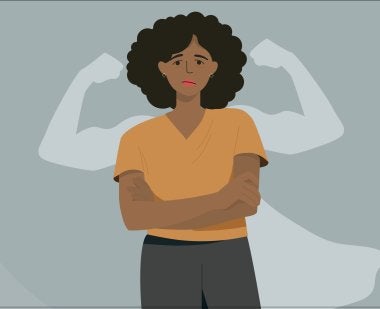
A lifetime of being silenced at work or school, hearing negative remarks about their hair or skin tone or being stereotyped as angry or aggressive can put Black women at higher risk of health issues including chronic stress, depression, anxiety and heart disease.
A recent study by a team including a researcher from the University of Maryland College of Education published in Psychology of Women Quarterly found that trying to be a superwoman and shake off the stress of racial and gender discrimination can exacerbate this unhealthy situation.
“Black women don't just experience racism. We also experience sexism,” said Jioni A. Lewis, an associate professor of counseling psychology and a corresponding author of the study. “It’s important to try to account for that nuanced experience.”
In an online survey, Lewis and colleagues at the University of Tennessee (UT) asked 185 Black women from across the United States about their experiences with gendered racism—the ways that women of color simultaneously face racism and sexism. They also asked them to report their levels of traumatic stress and how strongly they identified with certain social attitudes.
They examined the stereotype of the superwoman or strong Black woman who feels an obligation to present an image of strength, is able to handle problems without help and puts others’ needs before her own. Women who have internalized this idea believe that “they’re strong, they’re powerful, they can do all things,” said Lewis. “But what we’re finding is that this belief might not be helpful and might actually be harmful to their health.”
Survey respondents who felt they needed to be strong and self-sufficient were more likely to engage in harmful coping strategies to deal with gendered racism, such as blaming themselves or detaching from their emotions.
The study, part of Anahvia T. Moody’s dissertation at UT, also examined the coping strategies of women who had a strong understanding of how racism and sexism affect women of color. Women who had this awareness were more likely to stand up for themselves, educate others and advocate for change. Although these coping strategies are more empowering, the women who embraced them still faced negative health impacts resulting from gendered racism.
Lewis hopes that this study encourages therapists to ask their Black female clients about how racism and sexism contribute to stress in their lives. This could help Black women feel safe talking about these topics in therapy, especially with mental health professionals of different racial backgrounds. Therapists might also create more opportunities for Black women to engage in group therapy, where they can share similar experiences, get support and validation and adopt healthier coping strategies.
Lewis’s future research goes beyond looking at how Black women cope to explore how they can cultivate radical healing, which includes drawing on strengths like culture, spirituality, family and community to resist oppression and envision possibilities for a better future. “I’m focusing on things that are helping Black women survive and thrive, and what we can do to help protect women against the negative effects of gendered racism,” she said.



